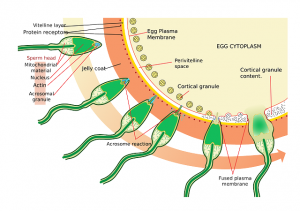
Adequate intakes of selenium for the synthesis of the selenoproteins are necessary to produce mature and viable sperm. The selenoprotein GPX4 seems to be indispensable:
- to the development and maturation of the sperm cells
- to the antioxidant protection of the sperm cells
- to the structural cohesiveness of the sperm cells
- to the motility and viability of the sperm cells [Foresta]
Selenium and semen quality
What are we talking about here? Let’s define some terms that are relevant to male fertility.
Our bodies produce semen by combining sperm cells from the testicles with various fluids from the seminal vesicles, the prostate, and the two small glands called Cowper’s glands. The semen needs to contain high counts of sperm cells – perhaps 200 million plus – and needs to contain sperm cells capable of good motility if one of the sperm cells is to succeed in reaching and fertilizing the mature female egg.


